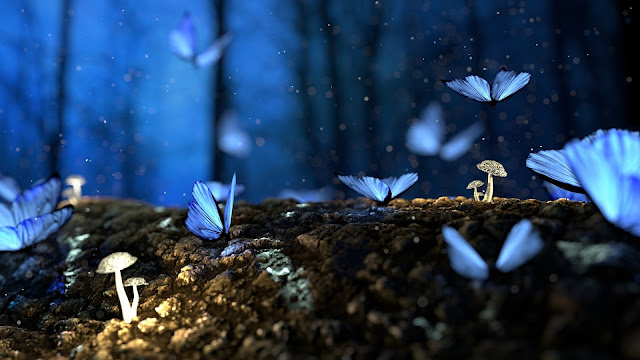Transformation: 6 fun ways to embrace change with your child
"It's all made up!"
My 7-year-old daughter came in sobbing and heartbroken, pulling at her small sapphire pendant that she'd worn every day since she received it at her last birthday. "Take it off!, there is no such thing as birthstones. People just made it up!" Ah, with heavy heart sprinkled with reverence, I recognize my daughter taking another step into form and forgetting, the cyclical journey we all take, our hero's journey in this lifetime.After birth, this marks another stage in human transformation, the 6/7-year change, sometimes called the first puberty. This transformation is marked physically first by the loss of the baby teeth and at the conscious level by individuation and separation from Oneness. It is often the point where memories and time begins. Rudolf Steiner delineated these shifts in soul development in 7 and 9-year cycles. The 7-year cycles are associated with astrology while the 9-year intervals are marked by involutions (inward growth) and evolutions (outward growth) based on the moon's ecliptic, which is in the exact same place as on they day or our birth every 18 years, 7 months and 9 days. At roughly 9 and 1/3rd years, about half way through the elliptic, at the descending node, we experience and internal severance from old beliefs; while at the full cycle of the elliptic, or ascending lunar node, is expressed in an outward change in the physical world, like a shift in family ties or home, new career, new friends, and so on. At each of these junctures the soul experiences transformation, or rebirth into a new aspect of life. While my daughter moves into the stage of Mercury and feeling deeply into the separated self, I am midway through a period of involution, just embarking on the stage of Jupiter, the beginning of wisdom and unfolding of the grasp of the ego. Ahh......
According to Hindu belief, there are 4 main stages of life, and these roughly follow the evolutions delineated by Steiner. The first stage is the student, Brahmacharya -Asrama, the second is the householder, Grihastha-Asrama, the third is the Forest stage, Vanaprastha-Asrama, and the fourth is the Renunciant, Sannyasa-Asrama. Within these are the momentary acts of consciousness. Kashmir Shaivism teaches that the soul continually performs the five acts of Shiva, the Godhead: shrishti (creation. illumination), sthiti (maintenance, enjoyment), samhara or samhriti (re-absorption, knowing), vilaya or pidhana (concealment of the nature, maya, planting a seed) and anugraha (blessings or grace, dissolution).
[The soul performs] these [five acts] by illuminating [the object], enjoying it, knowing it, planting a seed [of limiting memories], and dissolving [those limitations].Kṣemarāja, Pratyabhijňā-hrdayam
So, it seems, the human soul is continually, moment-by-moment transforming. We are in fact, never static, as our very thoughts of which there are about 50- 70,000 per day are undergoing the 5 acts of Shiva.
Transformation literally means going beyond your form.
Wayne Dyer
The earthly form is simply one phase in our soul's transmigratory journey. This plane is the mineralized, condensed form taking on matter. It is comparable to wintertime, and the darkness of night. Just as a seed in winter, Earth time is the time of the most rapid growth and transformation, the concentration of energetic forces that carry the soul to the higher realms and evolutions of spirit. The other phases of the souls journey, in the non-physical realm, are associated with the other elemental phases of water, air, and fire.
Transformation is an alchemical, energetic transference of earth (solidity), and water (movement), of the lower chakras into the combustion by fire. It is associated with the third, or navel chakra, Manipura.
Affirmation: I can change form
Chakra engaged: navel
What is the best way to help your child handle and revel in all this change? Through play.
💓Karen
Activity 1: Stories of transformation
 There are so many wonderful stories of transformation. For the younger child, in the Moon years, under 9, I recommend animal stories. Our animal allies, like Butterfly, Dragonfly, Ladybug and Frog give us so many rich, natural stories from which to draw. I particularly recommend the book, Waterbugs and Dragonflies: explaining death the young children by Doris Stickney. A simplified version of this story can be found at The Magic Onions for retelling. These animals speak to outward transformation, but can just as easily speak to the inward change, the death of childhood, for instance.
There are so many wonderful stories of transformation. For the younger child, in the Moon years, under 9, I recommend animal stories. Our animal allies, like Butterfly, Dragonfly, Ladybug and Frog give us so many rich, natural stories from which to draw. I particularly recommend the book, Waterbugs and Dragonflies: explaining death the young children by Doris Stickney. A simplified version of this story can be found at The Magic Onions for retelling. These animals speak to outward transformation, but can just as easily speak to the inward change, the death of childhood, for instance.
For the older child, and those going through the 9-year change, the Old Testament stories of the Bible are really powerful. Moreover, they continue to speak to our psyche throughout our lives as we move through our cycles of involution and evolution. Often told at too young of an age, the Old Testament from "Let there be light!" to Moses recounts the journey of the human soul in this physical plane, the hero's journey. Start with the journey out of Eden, which is the exodus from the blissful existence and Oneness with God of childhood in the garden of Eden to the experience of separation, duality, fear and judgment, the descent to Earth, and the rising of the Ego, the waking consciousness of I. This story resonates with children profoundly in their 9th year and beyond, as it mirrors poetically their internal experience (Out of the Garden and Into the Desert by Kennerk and Kennerk).
Activity 2: Celebrate the Passage
Among the Hopi, unmarried girls, wore their hair in whorls fashioned to look like butterflies. Polik Mana, the Hopi kachina deity, Butterfly Woman, is responsible for pollination in the Spring of all of the crops and flowers and is celebrated at the annual Butterfly Dance before the harvest in late summer. This is a traditional initiation rite for Hopi girls. Once married, they adopted a new hairstyle to mark their change in status.
Rites of passage fall into three main phases: separation, transition, and incorporation and there a many that we mark in our culture from yearly birthdays, to transitions and incorporations like baptism, graduation, marriage, new home, divorce, to major separations, like birth and death. Most are marked with feasting and friends, but there are a few transitions that are simpler and quieter, but equally as powerful. These include puberty, driving, military service, voting, and menopause. In some traditions, there is also the first communion or membership into a spiritual home. While it is not necessary to create a special ceremony for each of these, it is important to mark each of these with a sense of reverence, recognition and shift in attitude or responsibility toward this new form of being.
See my post Supernovae, Shooting Stars and Birthdays for birthday activities.
Activity 3: Transforming the elements
 |
| © C. Miller |
- Making mud pies in the mud kitchen
- Making potions
- Making paper or paper mache (mix flour, water and white glue)
- Dressing up
- Cooking
- Sculpting with clay or playdough
- Making a fire
- Making frozen treasures
For an easy and full-proof homemade playdough recipe, use Tinkergarten's Forest Putty. Also consider building an easy mud kitchen. There is lots of inspiration for mud kitchens on Pinterest. A brave friend of mine built hers in combination with a mud pit using bentonite clay (see picture above). Our simple kitchen and potion apothecary is made from wood scraps, bricks, wire racks, squirt bottles, old jars and kitchen tools.
 |
| ©Karen |
Activity 4: Playing birth and death
 Birth and re-birth happens through our consecutive lifetimes and also within this lifetime as we move into the different life stages. Human animals like all animals, spend a lot of time playing at the roles for which they are preparing (see Play by Stuart Brown).
Birth and re-birth happens through our consecutive lifetimes and also within this lifetime as we move into the different life stages. Human animals like all animals, spend a lot of time playing at the roles for which they are preparing (see Play by Stuart Brown). Play Birth
Young children love to playact birthing, by emerging from an egg, cocoon, or seed. See a sample script for narrating your child's play of emerging from a seed in Activity 4 in my post titled Creativity.
Play Death
Another way to play at transformation is to play dead. Yes- dogs know it, playing dead is a lot of fun. It's also a subtle way to introduce your child to meditation and the corpse yogic posture. You invite them to be completely still and relaxed. Then see if they are able to let their mind go dead too. It was actually through this very practice that a young, 17-year-old Ramana Maharshi discovered the great truth that our soul persists beyond our physical form, and it went on to become the basis for his teachings in the form of "Who Am I?"
Activity 5: Laughing circle
 This fun game is from Wheels of Life, by Anodea Judith. You need at least 3 people . Lie on the floor, each with their heads on the others stomach. One person begins with the sound "HA!," saying it three times. This is an expulsive sound, using the navel to push the sound with force through the diaphragm. It bobs the belly and the heads. The next person follows, going around the circle. Pretty soon, this turns into rolling, spontaneous laughter.
This fun game is from Wheels of Life, by Anodea Judith. You need at least 3 people . Lie on the floor, each with their heads on the others stomach. One person begins with the sound "HA!," saying it three times. This is an expulsive sound, using the navel to push the sound with force through the diaphragm. It bobs the belly and the heads. The next person follows, going around the circle. Pretty soon, this turns into rolling, spontaneous laughter.Activity 6: Songs to transform
Earth my body by Sasha Butterfly
Earth my body is a strong, repetitive and percussive chant that speaks to all the elements alive in us. Older children love it and love also to add in their own percussion.
Earth My Body by Sasha Butterfly
from the CD Earth Water Fire Air
Earth my body
Water my blood
Air my breath
and Fire my spirit
Butterfly Woman by Chic Gamine
For the older child, or the adult reparenting the inner child, I suggest Butterfly Woman by Chic Gamine.
Butterfly Woman from the CD Chic Gamine
Lyrics
Butterfly woman, only talk is cheap
So I'll show you how to walk and I'll give you the beat
Butterfly woman took me by the hand
She said first you're gonna have to learn to stand
Learn to stand, mmm
Butterfly woman said listen to me
I'll give you everything you need to live free
Butterfly woman said here is the truth
What don't make you still will help you move
Help you move, will help you move
And then she said hey ya, oh, hey ya, hey ya
Hey ya, oh, hey ya, hey ya
Hey ya, oh, hey ya, hey ya
Hey ya, oh
So many people here just talk the talk
Try to know when to love and know when to walk
Coming here you know I've seen it all
What don't make you strong will make you fall
Will make you fall, will make you fall
In this life I am the one that chose
The only way to change is by growing old
What I am to you may look weak
I'm as strong as the ground on which I sleep
On which I sleep, on which I sleep, oh oh oh
And then she said hey ya, oh, hey ya, hey ya
Hey ya, oh, hey ya, hey ya
Hey ya, oh, hey ya, hey ya
Hey ya, oh (oh, oh, oh)
Long ago before my hair turned gray
And my spine was bowed from the weight of days
Both my hips widened to bear the load
I thought that I could never grow old
But love has given me more, it seems
Than riches and worries that train and breed
And though my youth has wandered far and wide
These skinny old legs still don't break stride
Hey ya, oh, hey ya, hey ya
Hey ya, oh, hey ya, hey ya
Hey ya, oh, hey ya, hey ya
Hey ya, oh, hey ya, hey ya
Hey ya, oh, hey ya, hey ya
Hey ya, oh, hey ya, hey ya, oh oh oh oh oh
Oh, oh, oh oh....
Sources for further study
If the concepts I write about in this article interest you and you'd like to dive deeper, I include here links and books for adults for further study:- Out of the Garden and Into the Desert: the nine-year change through the stories of the third grade curriculum by Neal and Jennifer Kennerk
- You're Not the Boss of Me: Understanding the Six/Seven Year Transformation, Ruth Ker, editor
- The Six-Year Transformation by Michelle Brightwater, The Magic Onions
- The Stages of Life according to Rudolf Steiner by Thomas Armstrong. American Institute for Learning and Human Development
- Rudolf Steiner and Sri Aurobindo: An Introductory Comparison by Seth T. Miller. Spirit Alchemy
- The Splendor of Recognition: An Exploration of the Pratyabhijna-hrdayam, a Text on the Ancient Science of the Soul by Swami Shantananda and Peggy Bendet
Related Posts
Supernovae, Shooting Stars, and Birthdays |
| https://www.som-child.com/2018/11/supernovae-shooting-stars-and-birthdays.html |
Sponsors
Thank you to my sponsors for supporting this week's lessons.
Please contact me if you'd like to sponsor a post for Science of Mind child info *at* SOM-child.com. Find a the list of upcoming topics at The Center for Spiritual Awakening children's program.
 |
| https://www.centerforspiritualawakening.org/csachildrens-program.html |
#spiritual, #spiritualawakening, #kids, #parent, #DIY, #family, #transformation
Image credits
Unless otherwise noted, images from Pixabay, free for commercial use
Blue butterflies: Игорь Левченко
Graduation: Pham Trung Kien
Cocoons: GLady
Laughing children: Ben Kerckx
Frog and butterfly: Frank Winkler
Virtual Giving
Science of Mind Child is an ad-free viewing and learning experience. It is sustainable and supportive to me, my family and my community and to the creative expression of the Wisdom Keepers, the contributors to Science of Mind Child.If you have benefited from these teaching, please receive the virtual collection basket and DONATE generously. If everyone who visits this site gives $1, it supports the continuation and growth of this teaching.
See the Virtual Collection Basket Page for more information.







Comments
Post a Comment